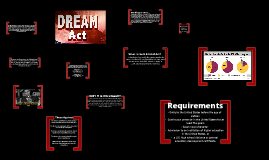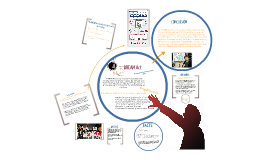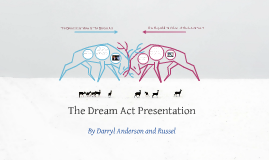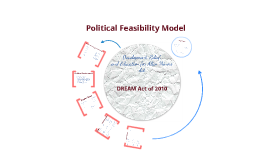DREAM Act
Transcript: A DREAM (Act) Deferred MELTING POT A place where immigrants of different cultures or races form an integrated society. Anti-Immigration Conflict? Americans should be more cautious about who and how many they allow into the country "Anti-Immigration Laws" to limit the number of immigrants Arizona State Laws on Immigration : aimed to identify, prosecute, and deport illegal immigrants The law states that failure to include immigration documents when asked may lead to detainment and deportation. Justification? The Governor of Arizona defended the law by saying: "This policy represents another tool for our state to use as we work to solve a crisis we did not create and the federal government has refused to fix." So what has the federal government done about Comprehensive Immigration Reform? federal government has made no major headway in comprehensive immigration reform in the past 10 years George W. Bush promised comprehensive reform during his 8 years in office, but was never produced due to a division in his party Similarly, President Obama has also promised for comprehensive reform, but there has not even been a vote in Congress on a comprehensive bill Obama's "Down Payment" on Comprehensive Immigration Reform? DREAM ACT So what is the DREAM Act? The DREAM Act, formerly known as the Development, Relief and Education for Alien Minors Act, was introduced to provide ELIGIBILTY for undocumented students to enter higher education AND a pathway to legal residency and eventually U.S. citizenship for undocumented students who were brought to the U.S. when they were 15 or younger. Who is it for? Who would it most impact? Nearly 65,000 undocumented students are denied the eligibility for higher education or to enlist in the army. As mentioned in the video, the DREAM Act would make the biggest impact on undocumented students who have grown up on the U.S. since they were brought here as a child, and have known no other country as their home. Some of these students do not even know abou their undocumented status until they reach adulthood and realize that they cannot apply to college despite having the credentials. What are the conditions? must have entered the U.S. before the age of 16 must be between the ages of 12 and 35 at the time of application must have good moral character must meet at least one of the following criteria: Graduated from a 2 yr. college or certain vocational colleges or studied for at least 2 years towards a B.A. or higher degree, OR Served in the U.S. armed forces for at least 2 yrs. DREAM Act would alter the current law in 2 major ways: First, it would remove a federal provision that discourages states from offering in-state tuition to undocumented students on the basis of their legal status Secondly, the DREAM Act would allow immigrant students who have grown up in the U.S. to apply for temporary legal status and eventually obtain permanent status PROs: Opportunity to further education, so students are more likely to stay off the streets, become involved in their communities, increase their quality of life, and become upstanding citizens With the knowledge that higher education is possible, undocumented students are more likely to graduate high school and contribute to a more skilled workforce which would make U.S. a better international competitor More upstanding citizens would result in a greater tax base for increased tax revenue. Higher education often correlates with higher salaries, so undocumented students would have more disposable income that would help stimulate the economy. U.S. would be adhering to its founding principles of encouraging and accepting diversity and allow immigrants to live the “American Dream” Rewards hard work and good moral character Fairness – students should not be punished for an action made by their parents Increase military enrollment numbers CONs: Amnesty “chain migration” Requires the federal government to stretch limited educational and state resources on benefits meant for citizens Unfair to offer undocumented students in-state tuition when citizens who are out of state are required to pay substantially higher tuition fees Takes away opportunities for students who are citizens by allotting admission space and financial aid to undocumented students Undocumented students may be unprepared academically and unaware of opportunities like the DREAM Act. In other words, critics say the DREAM Act would be futile How would DREAM Act implementation affect the U.S? would clearly affect some states more than others, because 3/4 of the potential beneficiaries live in just 10 states the college enrollment practices and tuition policies also vary from state to state, so this may be difficult to standardize in accordance with the DREAM Act has the potential to make the U.S. become the leader in education by educating people who want to be here and who want to give back to their country only about 13,000 undocumented students are likely to enroll in college the following

















